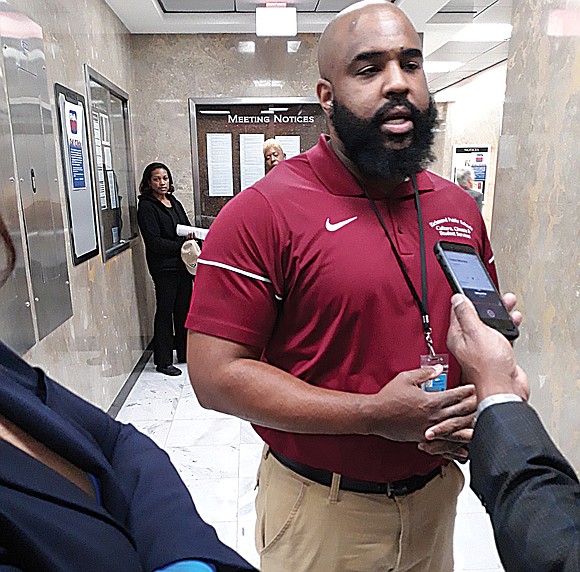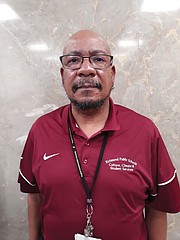RPS attendance officers’ jobs on chopping block despite crucial need, service
Jeremy M. Lazarus | 3/15/2019, 6 a.m.
With little public attention, the Richmond delegation to the General Assembly joined most Democrats and Republicans last year in voting to dismantle most of the 20-year-old requirements imposed on Virginia public schools to prevent truancy.
The bill that became law doubled from five to 10 the number of days that a student could miss, allowed schools to wait another 10 days before meeting with parents, eliminated most of the authority of school attendance officers to be involved and allowed school districts to use volunteers instead of paid staff to work on attendance issues.
It remains unclear why the leader of House Democrats, Delegate Eileen Filler-Corn of Fairfax County, wanted to defang the truancy law or why Richmond legislators so eagerly embraced the proposal to largely take the state Department of Education and school districts off the hook for enforcing the state’s compulsory attendance law.
But the impact is being felt in Richmond, which has long been a Virginia leader in truancy and dropouts. In the city of Richmond, 4,500 students, or about one in four, miss 10 or more days of class each year, according to state records. And nearly 600 students, or about one in three, who are enrolled in ninth grade fail to graduate four years later.
While he has not responded to a request for comment, Richmond Public Schools Superintendent Jason Kamras appears to have spotted the truancy law change, and with majority support on the Richmond School Board, is using it as part of his effort to cut $13 million from central office expenses.
The 2019-20 budget the School Board sent to the city recently calls for saving more than $500,000 by eliminating the 21 positions previously allotted for attendance officers, who have served on the front lines of truancy prevention since 2014 when RPS reclaimed the work from the Richmond Police Department.
Mr. Kamras wants to replace the attendance officers, who are out in the community trying to carry out their assigned task of reducing truancy, with seven “attendance liaisons.”
While the duties are unspecified, the new liaisons apparently would work with principals, who under the 2018 legislation, are now the in-school officials with the most responsibility for truancy prevention.
John Butcher, a private statistician who uses state data to monitor RPS’ performance and who first noted the change in state law, calls the change a way for school systems like Richmond to wash their hands of students who don’t want to attend.
“Students who are not in school can’t be taught,” Mr. Butcher wrote in a trenchant commentary on the change. “Students who are truant frequently drop out. Students who have dropped out cannot lower the pass rates on state Standards of Learning tests.”
While the Richmond School Board has endorsed the plan, a backlash is starting to develop among City Council members worried that Richmond’s chronic truancy will only become worse with the loss of attendance officers, and that families and children who have come to rely on the officers would find themselves with no one to lean on.
Several members of City Council, including Reva M. Trammell, 8th District, and Kim B. Gray, 2nd District, a former School Board member, issued strong criticism of the Kamras plan after five of the officers appeared before City Council on Monday night to plead for help.
Butler Peterson, an 18-year RPS veteran who has spent five years as an attendance officer, acted as spokesman for the officers, who were notified last week that their jobs were on the chopping block. So far, they have not been told if they can be considered for the liaison positions.
Truancy was always a schools responsibility, but during former Mayor L. Douglas Wilder’s tenure, he sought to give the issue a higher profile and handed it to police, who set up diversion centers and spent time rounding up young people. Interest waned, however, and RPS regained truancy control under Mayor Wilder’s successor, former Mayor Dwight C. Jones.
Mr. Peterson told the council that the officers, now reduced to 17, started the school year as usual, tracking down enrolled students who were on the “no show list” and whose failure to attend not only would hurt their educational prospects, but could result in Richmond losing state funding due to having a smaller student body.
Now they are engaged in the day-to-day task of trying to catch up with students who have missed at least five days without an excuse.
“We conduct home visits in some of the most impoverished and high-crime neighborhoods in the city,” Mr. Peterson said. “We are the boots on the ground. We are a lifeline for these families. We are the heartbeat of RPS.”
He offered examples of the wraparound services and support that attendance officers provide, including ensuring that students in need have clothes to wear and that families are connected with services that the parents never knew existed or didn’t know how to contact.
Mr. Peterson recounted how an attendance team saved one bullied student from hanging herself and how others got three elementary students back to class after they were found panhandling on Midlothian Turnpike at the behest of parents who needed money to support drug habits.
One officer, he said, checks daily to ensure that youths who have cut classes are not playing on railroad tracks on South Side to keep them from getting killed.
“We see it all,” said attendance officer Breon Eppes, including teens who are defying parents and neglected young children whose parents are indifferent to education.
Rather than acting as police officers, Mr. Peterson said he and his colleagues spend most of their efforts building relationships with parents and the children, and they regularly get calls from other people concerned about children they know should be in school.
He said the attendance team rarely takes parents to court for failing to ensure their children attend class, and only in cases where parents are deliberately keeping their children out of school.
Mr. Peterson called on City Council to find funding to keep the attendance officers employed “so we can continue to make a difference. If we aren’t there, who will do what we do? There won’t be anyone. Our department is critical to enforcing the attendance policy for RPS.”
Ms. Gray, who is considering offering budget language that would block RPS from eliminating the attendance officers, agreed.
“The work of the attendance officers is crucial,” Ms. Gray told her council colleagues.
She said she personally has seen the impact attendance officers make and cannot fathom how any responsible member of the School Board would want to eliminate staff who go where others fear to tread to find students and get them back in school.
Ms. Trammell also found it incomprehensible that the school system would lay off all of the attendance officers. She said that attendance officers often are the ones to respond to problems involving children.
“This is not right,” she said.








